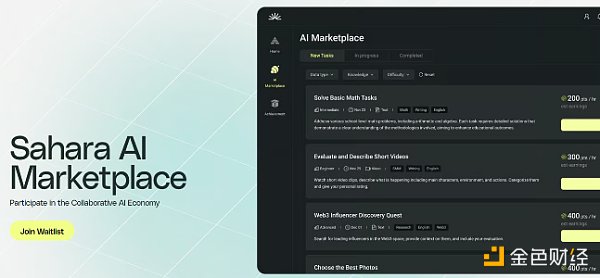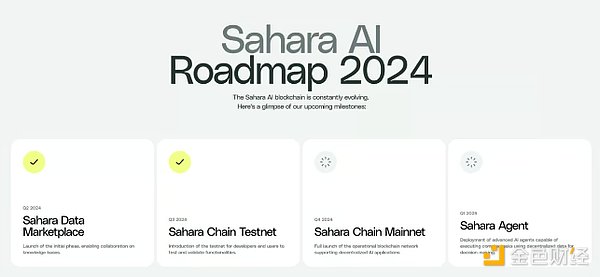پانچ منٹ میں سہارا AI کے بارے میں جانیں: اسے اعلی VCs کی حمایت میں $43 ملین کیوں ملے
ahara has been quiet for months, but just announced this week that it had raised a huge $43 million.
This is a huge change, making it one of the largest financing rounds in the crypto AI field. It is also a strong signal of investor interest.
They have obtained some top backers, with Pantera, Polychain and Sequoia all involved. But what really caught our attention were the advisors, including the co-founder of Nous Research and a founding member of Midjourney.
We have a soft spot for teams with lofty ambitions, so we did what we do best: dig deep into everything we could find on Sahara and distill it into a quick 5-minute read.
Sahara CEO Sean Ren appeared on Show Me the Crypto (Episode 134). We watched the full hour, so you don’t have to.
Collaborative AI Economy
Sahara AI is building the AI infrastructure layer to make decentralized AI a reality.
Their plans? Ambitious to say the least. They’re working on:
- AI-native blockchain
- User-friendly developer tools
- Secure data storage, and more
Users contribute their personal data to build domain-specific knowledge bases, developers use that data to train and deploy AI agents, infrastructure providers host Sahara nodes, and enterprises get tailored AI solutions.
But let’s face it — you can’t achieve great visions by trying to do everything everywhere at once.
Start with a sharp product wedge and grow from there.
Sahara’s First Product: AI Marketplace
Sahara’s initial product is the AI Marketplace, which is a key pillar of their go-to-market strategy.
During discussions with their seed investors, it became clear that this بازار was a preview of how they planned to achieve their ultimate vision. This was their first step, even before the Sahara Chain testnet was launched.

Source: Sahara
On the marketplace, users can complete tasks that help train AI. These tasks range from solving math problems to summarizing videos, which are essentially all about data labeling and annotation.
The submissions will then be used to train an AI model through reinforcement learning. In return, people who complete tasks will receive points and may be awarded tokens in the future (although this is purely speculation at this point).
Enterprise customers such as MIT, Microsoft, USC, and Motherson Group have already begun using this decentralized data marketplace to train their AI models. It will soon be open to the public.
The marketplace offers a powerful set of tools, including a data toolkit (for collection, labeling, QA, etc.), a distribution engine, and project management tools.
Why is Sahara doing this?
Sahara concluded that the current challenges facing AI require a new level of data labeling and annotation.
Sahara CEO Sean Ren explains:
“We’re trying to build our network to enable 200,000 data annotators to work on these enterprise-level tasks. These data annotators come from all over the world, mainly from Africa and Asia Pacific, and they have different expertise, languages, and cultural backgrounds.
Some of them have never worked on data labeling tasks before, but that’s the challenge. How do you make a product that looks very user-friendly, so that first-time data labelers can participate and generate high-quality data for large enterprise customers such as Microsoft, Amazon, Snapchat, etc.?”
Your Knowledge, Your AI
One of the biggest issues facing AI right now is copyright. Earlier this year, several US newspapers filed a lawsuit against OpenAI for copyright infringement – and this is just the tip of the iceberg.
When OpenAI trained ChatGPT, it did not acknowledge the contributions of Reddit, Wikipedia, and GitHub users – the massive databases it used to train its models.
Sahara believes this is a fundamental flaw. They recognize that these user contributions are very valuable, and it is only fair that users benefit from them. Sound familiar? We mentioned this before when we wrote about Vana, the Robin Hood of User Data.
Sahara believes that if you contribute value to the AI process — whether by sharing knowledge on an AI marketplace or uploading personal data for your own AI agent — you should own it.
That’s where “Provenance” comes in.
In the context of Sahara, Provenance means adding a user watermark to your data. Messages, emails, content — everything will be stamped with your unique watermark. That way, anyone who uses your data to develop an AI application or train a model will have to pay for it. Provenance also extends to models and applications.
This way, Sahara ensures that the original contributors are recognized and compensated accordingly.
Alpha
Sahara is still in its early stages, but momentum is building. Back in May, they opened up testnet registrations, which attracted 25,000 applicants.
The Sahara mainnet is expected to launch sometime in Q4 2024. You can join their waitlist یہاں.
The Team
Sahara CEO and co-founder Sean Ren has a rich background in AI. He is an associate professor at the University of Southern California, specializing in natural language processing and artificial intelligence, and has won multiple awards for his research and innovation in AI.
Sahara COO and co-founder Tyler Zhou served as the Investment Director of Binance Labs before founding Sahara.
You can learn about the background of the rest of the team یہاں.
Our Thoughts

- Sahara has an ambitious roadmap for the rest of the year, which includes the delivery of the mainnet. If they can achieve this, it will be a strong testament to the team’s capabilities.
- To be honest, there is not enough public information yet to evaluate Sahara in depth (although Litepaper is coming soon). A lot of what we hear sounds promising and aspirational, but the real test will be whether they can achieve their goals.
Related: Why Meme Coins Could Create a Legal Minefield for Celebrities
Iggy Azalea and Andrew Tate face off in the world of crypto. Image: Shutterstock MOTHER? DADDY? Meme coins created or promoted by celebrities can bring huge gains and attention, but also major legal pitfalls to avoid. With over 500,000 tokens launched in May alone, there’s been a massive surge in the volume of meme coin offerings. Thanks in part to sites like Pump.fun, anyone can now easily spin up a token symbol, upload an image, and launch a meme coin. And thanks to social media and trading bots, it’s also easier than ever for meme coins to go viral and make massive profits. Given all of that, it is not at all surprising that we are now seeing a renewed wave of celebrities jumping into the crypto space with their own…







